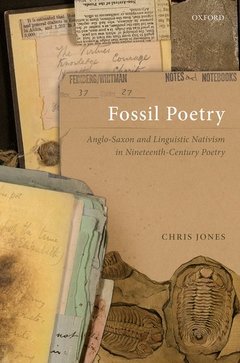Description
Fossil Poetry
Anglo-Saxon and Linguistic Nativism in Nineteenth-Century Poetry
Author: Jones Chris
Language: English
Publication date: 08-2018
328 p. · 16.3x24.2 cm · Hardback
328 p. · 16.3x24.2 cm · Hardback
Description
/li>Biography
/li>
Fossil Poetry provides the first book-length overview of the place of Anglo-Saxon in nineteenth-century poetry in English. It addresses the use and role of Anglo-Saxon as a resource by Romantic and Victorian poets in their own compositions, as well as the construction and 'invention' of Anglo-Saxon in and by nineteenth-century poetry. Fossil Poetry takes its title from a famous passage on 'early' language in the essays of Ralph Waldo Emerson, and uses the metaphor of the fossil to contextualize poetic Anglo-Saxonism within the developments that had been taking place in the fields of geology, palaeontology, and the evolutionary life sciences since James Hutton's apprehension of 'deep time' in his 1788 Theory of the Earth. Fossil Poetry argues that two, roughly consecutive phases of poetic Anglo-Saxonism took place over the course of the nineteenth century: firstly, a phase of 'constant roots' whereby Anglo-Saxon is constructed to resemble, and so to legitimize a tradition of English Romanticism conceived as essential and unchanging; secondly, a phase in which the strangeness of many of the 'extinct' philological forms of early English is acknowledged, and becomes concurrent with a desire to recover and recuperate the fossils of Anglo-Saxon within contemporary English poetry. The volume advances new readings of work by a variety of poets including Walter Scott, Henry Longfellow, William Wordsworth, William Barnes, Walt Whitman, Ralph Waldo Emerson, William Morris, Alfred Tennyson, and Gerard Hopkins.
Chris Jones teaches at the University of St Andrews. His previous book Strange Likeness: The Use of Old English in Twentieth-century Poetry (OUP, 2006) was shortlisted for the ESSE best book prize of 2007.
© 2024 LAVOISIER S.A.S.




